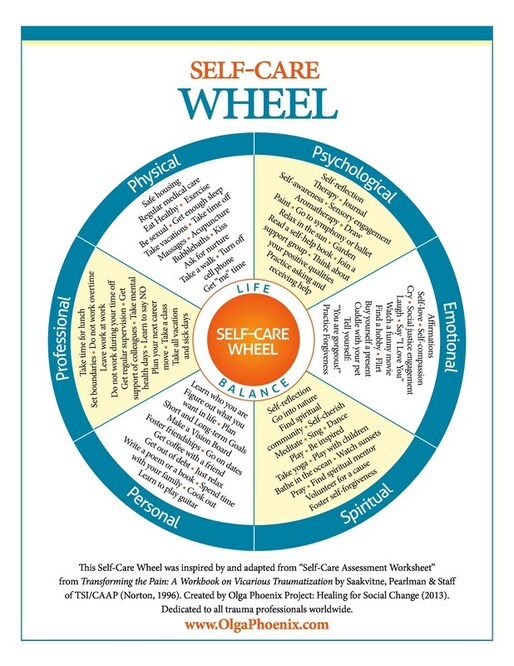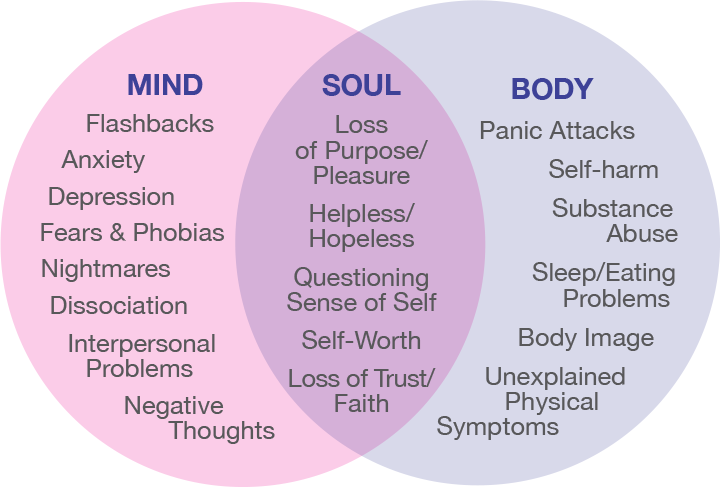Trauma
“Individual trauma results from an event, series of events, or set of circumstances experienced by an individual as physically or emotionally harmful or life-threatening with lasting adverse effects on the individual’s functioning and mental, physical, social, emotional, or spiritual well-being.” (SAMHSA)
Trauma is defined by the Centre for Addiction and Mental Health (2019) as the “lasting emotional response that often results from living through a distressing event. Experiencing a traumatic event can harm a person’s sense of safety, sense of self, and ability to regulate emotions and navigate relationships. Long after the traumatic event occurs people with trauma can often feel shame, helplessness, powerlessness and intense fear”. (www.camh.ca)
An event is considered traumatic if the person experienced, witnessed, or was confronted with an event or events that involved actual or threatened death, serious injury, or sexual violence (American Psychiatric Association [APA], 2013).
An event is considered traumatic if the person experienced, witnessed, or was confronted with an event or events that involved actual or threatened death, serious injury, or sexual violence (American Psychiatric Association [APA], 2013).
Types of Trauma
ATEN recognizes there are several types of traumatic experiences. The National Traumatic Stress Network (2008) provides definitions of types of traumatic events; differentiating them from one another based on the event, who is involved, and the interpretation of law. Below are brief definitions to capture the core of each type of trauma.
- Sexual Abuse or Assault: Actual or attempted sexual contact, exposure to age-inappropriate sexual material or environments, sexual exploitation, unwanted or coercive sexual contact. Includes sexual human trafficking and exploitation.
- Physical Abuse or Assault: Actual or attempted infliction of physical pain with or without use of an object or weapon and including use of severe corporeal punishment.
- Emotional Abuse/Psychological Maltreatment: Acts of commission against a child or adult, other than physical or sexual abuse, that caused or could have caused conduct, cognitive, affective or other mental disturbance, such as verbal abuse, emotional abuse, excessive demands on a person’s performance that may lead to negative self-image and disturbed behavior. Acts of omission against a child that caused or could have caused conduct, cognitive, affective or other mental disturbance, such as emotional neglect or intentional social deprivation.
- Neglect: Failure by the child victim's caretaker(s) to provide needed, age-appropriate care although financially able to do so, or offered financial or other means to do so, including physical neglect, medical neglect, or educational neglect.
- Serious Accident or Illness/Medical Procedure: Unintentional injury or accident, having a physical illness or experiencing medical procedures that are extremely painful and/or life threatening.
- Witness to Domestic Violence: Exposure to emotional abuse, actual/attempted physical or sexual assault, or aggressive control perpetrated between a parent/caretaker and another adult in the child victim's home environment or perpetrated by an adolescent against one or more adults in the child victim's home environment.
- Victim/Witness to Community Violence: Extreme violence in the community, including exposure to gang-related violence.
- School Violence: Violence that occurs in a school setting, including, but not limited to school shootings, bullying, interpersonal violence among classmates, and classmate suicide.
- Natural or Manmade Disasters: Major accident or disaster that is an unintentional result of a manmade or natural event.
- Forced Displacement: Forced relocation to a new home due to political reasons, generally including political asylees or immigrants fleeing political persecution.
- War/Terrorism/Political Violence: Exposure to acts of war/terrorism/political violence including incidents such bombing, shooting, looting, or accidents that are a result of terrorist activity as well as actions of individuals acting in isolation if they are considered political in nature.
- Victim/Witness to Extreme Personal/Interpersonal Violence: Includes extreme violence by or between individuals including exposure to homicide, suicide and other similar extreme events.
- Traumatic Grief/Separation: Death of a parent, primary caretaker or sibling, abrupt and/or unexpected, accidental or premature death or homicide of a close friend, family member, or other close relative; abrupt, unexplained and/or indefinite separation from a parent, primary caretaker or sibling due to circumstances beyond the child victim's control.
- System-Induced Trauma: Traumatic removal from the home, traumatic foster placement, sibling separation, or multiple placements in a short amount of time.
- Intergenerational Trauma: The transmission of trauma from one generation to the next.
Symptoms and Impact of Trauma
Peter Levine lists several other symptoms of trauma in his book Healing Trauma (2008).
- mental "blankness" or spaced-out feelings
- avoidance behavior (avoiding places, activities, movements, memories, or people)
- attraction to dangerous situations
- addictive behaviors (overeating, drinking, smoking, etc)
- exaggerated or diminished sexual activity
- amnesia and forgetfulness
- inability to love, nurture, or bond with other individuals
- fear of dying or having a shortened life
- self-mutilation (severe abuse, self-inflicted cutting)
- loss of sustaining beliefs (spiritual, religious, interpersonal)
Symptoms that may show up years later.
- excessive shyness
- diminished emotional response
- inability to make committments
- chronic fatigue or very low physical energy
- immune system problems and certain endocrine problems such as thyroid malfunction and environmental sensitivities
- psychosomatic illnesses, particularly headaches, migraines, neck and back pain
- chronic pain
- fibromyalgia
- asthma
- skin conditions
- digestive problems (spastic colon)
- severe premenstral syndrome
- depression and impending doom
- feelings of detachment, alienation, and isolation ("living dead" feelings)
- reduced ability to formulate plans
Levine, P.A. (2008). Healing trauma: a pioneering program for restoring the wisdom of your body. Sounds True.
Recovery From Trauma
Healing and recovery can mean different things for different people. You will probably have ups and downs, you may feel frustrated for not recovering as quickly as others think you should.
Whether the trauma happened recently or years ago, self-care is a proven practice to help reduce many trauma symptoms. Self-care is a necessary part of recovery from trauma.
Self-care is a right, responsibility and obligation to tend to our own healthy functioning.
There are six dimensions of self-care:
Whether the trauma happened recently or years ago, self-care is a proven practice to help reduce many trauma symptoms. Self-care is a necessary part of recovery from trauma.
Self-care is a right, responsibility and obligation to tend to our own healthy functioning.
There are six dimensions of self-care:

- Physical
- Emotional
- Spiritual
- Personal
- Psychological
- Professional
- It is very important for you to remember that the trauma in no way was your fault, that you did not cause it to happen, and you did what you had to do to survive.
- Be patient. Everyone goes through the healing process at their own pace.
- Believe in your strengths, admire your courage, and have hope for the future. Remind yourself of these.
- You are not alone.
- Help is available to you.
- You have the right to receive assistance from people who will believe you and help you heal.
- Don’t just try to “forget” about the traumatic event.
- Seek medical attention when you need it. Do not put it off.
- Distance yourself from anyone who makes you feel negative, drains your energy, or asks too much of you.
- Be gentle with yourself – allow yourself more time to complete tasks, more time to rest, and be kind and patient with yourself.
Self-Care
- Exercise (a short walk counts!) – getting your body moving can help restore your body after trauma.
- Give yourself permission to feel whatever emotions come up for you (allow yourself to cry).
- Be careful – avoid tasks that take a lot of intense concentration as your ability to focus immediately after a trauma can be impaired.
- Limit your caffeine and alcohol consumption. While both may initially appear to soothe you, caffeine can increase agitation and alcohol acts as a depressant.
- Review what you have learned about stress, trauma, and healthy coping – remind yourself that what you are feeling is normal.
- You have the right to decide who can touch your body.
- Talk about your feelings with people you trust and feel safe with. This includes friends, family members, counsellors, health professionals, or connect with survivors of sexualized violence. Social support can make you feel less isolated and more connected.
- Do things you enjoy – watch a silly movie, reading, or visiting a beautiful park.
- Don’t avoid thinking about the trauma.
- Write about your experience and feelings.
- Practice stress reduction and relaxation activities, such as yoga, stretching, guided meditation, progressive muscle relaxation, and other mindfulness activities.
- Maintain a regular sleep schedule and try to get plenty of rest. If you are tired, nap. It’s okay, you are healing.
- Eat regular, balanced meals and snacks.
- Schedule and adjust your routine immediately following a trauma to include more time with support people and less time alone
For more information visit our Resources page
Proudly powered by Weebly

